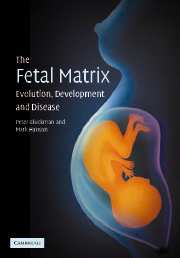Book contents
- Frontmatter
- Contents
- Preface
- 1 Shaping our destiny: genes, environment and their interactions
- 2 Mother and fetus
- 3 Fetal choices
- 4 Predictive adaptive responses and human disease
- 5 Obesity, diabetes and other diseases
- 6 The biology of predictive adaptive responses
- 7 Predictive adaptive responses – critical processes in evolution
- 8 Evolutionary echoes and the human camel
- 9 Improving human health
- 10 Fetal futures
- Further reading and references
- Index
8 - Evolutionary echoes and the human camel
Published online by Cambridge University Press: 05 November 2011
- Frontmatter
- Contents
- Preface
- 1 Shaping our destiny: genes, environment and their interactions
- 2 Mother and fetus
- 3 Fetal choices
- 4 Predictive adaptive responses and human disease
- 5 Obesity, diabetes and other diseases
- 6 The biology of predictive adaptive responses
- 7 Predictive adaptive responses – critical processes in evolution
- 8 Evolutionary echoes and the human camel
- 9 Improving human health
- 10 Fetal futures
- Further reading and references
- Index
Summary
Humans are animals: but we are animals that evolved with a number of distinct characteristics. It is now believed that Homo sapiens appeared as a distinct species about 150000 years ago– that is since our definitive speciation there have been perhaps less than 7000 generations. All the diversity of human phenotypes has appeared in only that time and, importantly, through that evolutionary time the human species has adapted to a wide range of environments. Humans can manipulate their own environment in a variety of ways and to an extent not available to other species – for example to make and wear clothing or make fire to regulate the thermal environment. With the development of agriculture less than 10000 years ago humans developed the ability to manipulate their food supplies. There have also been dramatic changes in the nature of our food intake. Humans have developed a number of ways to reduce internal energy expenditure from wheels to computers – this reduction in daily energy expenditure has been particularly accelerated in recent decades. With the development of religious beliefs and sets of cultural values, humans have developed a commitment to care for those in their species with a limited capacity to survive. Thus it has been suggested that, in humans, Darwinian evolution is no longer active or has been slowed dramatically because both environmental conditions and the processes of natural selection have been greatly attenuated by our human behaviour.
- Type
- Chapter
- Information
- The Fetal Matrix: Evolution, Development and Disease , pp. 173 - 189Publisher: Cambridge University PressPrint publication year: 2004



